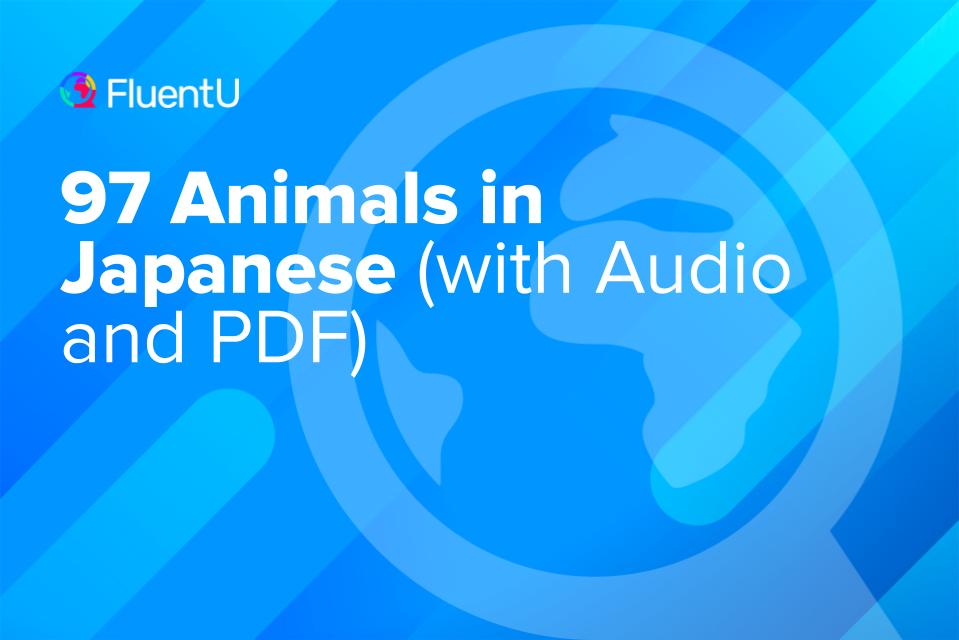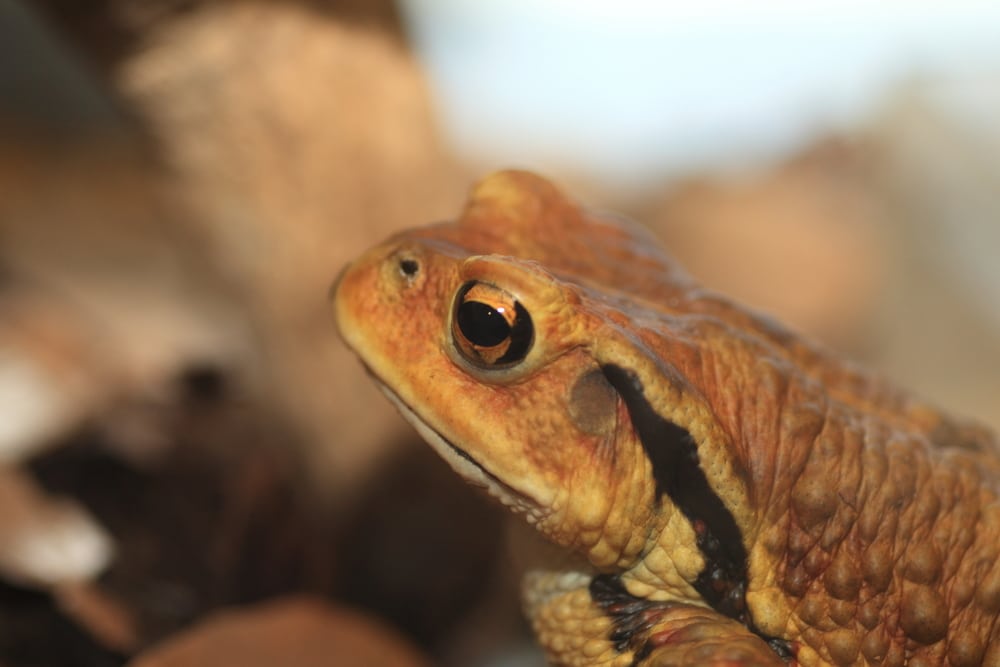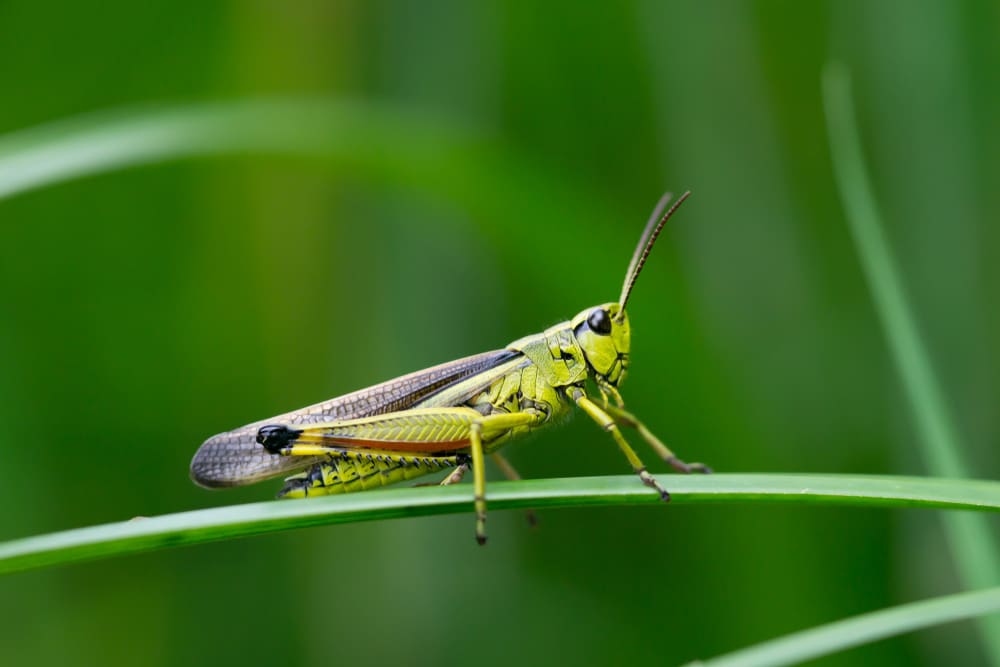97 Animals in Japanese (with Audio and PDF)

We talk about animals a lot more than we realize: We have our lion’s share of animal idioms, we give humans animal characteristics and we gush about our pets.
If you’re studying Japanese, you’ll need to know at least a few animal terms, since Japanese people are just like everyone else when it comes to our mutual obsession with fuzzy creatures.
Download: This blog post is available as a convenient and portable PDF that you can take anywhere. Click here to get a copy. (Download)
Common Pets in Japanese

| Japanese | Romaji | English |
|---|---|---|
| フェレット | feretto | ferret |
| ハムスター | hamusutā | hamster |
| ハリネズミ | harinezumi | hedgehog |
| 犬 | inu | dog |
| カメ | kame | turtle |
| 子猫 | koneko | kitten |
| 子犬 | koinu | puppy |
| 猫 | neko | cat |
| 鼠 | nezumi | mouse / rat |
| オウム | ōmu | parrot |
| 魚 | sakana | fish |
| ニワトリ | tori | bird |
| 兎 | usagi | rabbit |
Farm Animals in Japanese

| Japanese | Romaji | English |
|---|---|---|
| 豚 | buta | pig |
| 羊 | hitsuji | sheep |
| 鶏 | niwatori | chicken |
| 鴨 | kamo | duck |
| ロバ | roba | donkey |
| 七面鳥 | shichimenchō | turkey |
| 馬 | uma | horse |
| 牛 (ウシ) | ushi | cow |
| 山羊 | yagi | goat |
Sea Creatures in Japanese

| Japanese | Romaji | English |
|---|---|---|
| アザラシ | azarashi | seal |
| エビ | ebi | shrimp |
| ハマグリ | hamaguri | clam |
| イルカ | iruka | dolphin |
| イカ | ika | squid |
| 伊勢エビ | ise-ebi | lobster |
| カキ | kaki | oyster |
| ヒトデ | hitode | starfish |
| 蟹 | kani | crab |
| クラゲ | kurage | jellyfish |
| 鯨 | kujira | whale |
| マンタレイ | manta rei | manta ray |
| ナマコ | namako | sea cucumber |
| ロブスター | robusutā | lobster |
| 鮫 | same | shark |
| タツノオトシゴ | tatsunootoshigo | seahorse |
| タコ | tako | octopus |
| 海亀 | umigame | sea turtle |
| ウナギ | unagi | eel |
| ウニ | uni | sea urchin |
Animals with Wings in Japanese

| Japanese | Romaji | English |
|---|---|---|
| 蝶々 | chōchō | butterfly |
| フクロウ | fukurou | owl |
| 蛾 | ga | moth |
| 鳩 | hato | pigeon/dove |
| 隼 (ハヤブサ) | hayabusa | falcon |
| 烏 (カラス) | karasu | crow |
| 蜜蜂 | mitsubachi | bee |
| 雀 | suzume | sparrow |
| ツバメ | tsubame | swallow |
| 鶴 | tsuru | crane |
| 鷹 | taka | hawk |
| 鷲 | washi | eagle |
Wild Animals in Japanese

| Japanese | Romaji | English |
|---|---|---|
| 穴熊 | anaguma | badger |
| 猪 | inoshishi | wild boar |
| イタチ | itachi | weasel |
| キリン | kirin | giraffe |
| 狐 | kitsune | fox |
| コウモリ | kōmori | bat |
| 熊 | kuma | bear |
| ニホンザル | nihonzaru | snow monkey |
| 狼 | ōkami | wolf |
| パンダ | panda | panda |
| 猿 | saru | monkey |
| 鹿 | shika | deer |
| ライオン | raion | lion |
| 狸 | tanuki | raccoon dog |
| 虎 | tora | tiger |
| 象 | zō | elephant |
Reptiles and Amphibians in Japanese

| Japanese | Romaji | English |
|---|---|---|
| 蛇 | hebi | snake |
| ヒキガエル | hikigaeru | toad |
| イモリ | imori | newt |
| カエル | kaeru | frog |
| トカゲ | tokage | lizard |
| ワニ | wani | crocodile |
| ヤモリ | yamori | gecko |
Small Critters in Japanese

| Japanese | Romaji | English |
|---|---|---|
| 青虫 | aomushi | caterpillar |
| 蟻 | ari | ant |
| 蛾 | ga | moth |
| ゴキブリ | gokiburi | cockroach |
| 蛍 | hotaru | firefly |
| 蚊 | ka | mosquito |
| 蚕 | kaiko | silkworm |
| カマキリ | kamakiri | praying mantis |
| カタツムリ | katatsumuri | snail |
| バッタ | batta | grasshopper |
| 甲虫 | kōchu | beetle |
| コオロギ | kōrogi | cricket |
| 蜘蛛 | kumo | spider |
| ミミズ | mimizu | earthworm |
| ムカデ | mukade | centipede |
| ノミ | nomi | flea |
| 大雀蜂 | ōsuzumebachi | Japanese giant hornet |
| 蝉 | semi | cicada |
| てんとう虫 | tentōmushi | ladybug |
| トンボ | tonbo | dragonfly |
| 夜蛾 | yaga | night moth |
Animal-related Words in Japanese

| Japanese | Romaji | English |
|---|---|---|
| 動物 | dōbutsu | animals |
| 動物園 | dōbutsuen | zoo |
| 羽 | hane | feathers |
| 髭 | hige | whiskers |
| 蹄 | hizume | hooves |
| 毛 | ke | fur |
| 牙 | kiba | fang / tooth |
| 嘴 | kuchibashi | beak |
| 前足 | maeashi | front legs |
| 招き猫 | manekineko | lucky cat |
| 水掻き | mizukaki | web / flipper |
| 猫カフェ | neko kafē | cat cafe |
| 尾 | o (formal) | tail |
| しっぽ | shippo (casual) | tail |
| 水族館 | suizokukan | aquarium |
| 爪 | tsume | claws |
| 鱗 | uroko | scales |
| 後ろ足 | ushiroashi | back legs |
You can even check out animal sounds in Japanese here:
https://www.fluentu.com/blog/japanese/japanese-animal-sounds/
Why Should I Learn Japanese Animal Words?
Need some more convincing? Here are three crucial reasons to add some animal words to your Japanese vocabulary:
- We talk about animals and animal-related things more than we realize in everyday conversation. If you want to become more fluent, you’ll need to know these words at some point.
- Bulking up your vocabulary list will only increase your fluency in Japanese. Having a hefty vocabulary is a major part of improving fluency on your language-learning journey.
- Some Japanese animal words are difficult to pronounce or challenging to write, making them an ideal challenge for those who want to reach a new level in Japanese. Japanese nouns, including animal words, may have complicated kanji or be difficult to pronounce.
What better way to improve your Japanese than to challenge yourself with more difficult words?
Animal words are pretty interesting, aren’t they? When it comes to Japanese, it’s interesting to see how the kanji for some words resemble the animal they describe. You can even look into zodiac signs in Japanese since they’re based on animals. Try to see these words in use to help you understand them in context, too, such as through the immersion program FluentU.
FluentU takes authentic videos—like music videos, movie trailers, news and inspiring talks—and turns them into personalized language learning lessons.
You can try FluentU for free for 2 weeks. Check out the website or download the iOS app or Android app.
P.S. Click here to take advantage of our current sale! (Expires at the end of this month.)

From pets to insects, add the animal words above to your vocabulary list and learn them to bring your language one step closer to fluency… and nature!
Download: This blog post is available as a convenient and portable PDF that you can take anywhere. Click here to get a copy. (Download)
And One More Thing...
If you love learning Japanese with authentic materials, then I should also tell you more about FluentU.
FluentU naturally and gradually eases you into learning Japanese language and culture. You'll learn real Japanese as it's spoken in real life.
FluentU has a broad range of contemporary videos as you'll see below:

FluentU makes these native Japanese videos approachable through interactive transcripts. Tap on any word to look it up instantly.

All definitions have multiple examples, and they're written for Japanese learners like you. Tap to add words you'd like to review to a vocab list.

And FluentU has a learn mode which turns every video into a language learning lesson. You can always swipe left or right to see more examples.

The best part? FluentU keeps track of your vocabulary, and gives you extra practice with difficult words. It'll even remind you when it’s time to review what you’ve learned. You'll have a 100% personalized experience.
Start using the FluentU website on your computer or tablet or, better yet, download the FluentU app from the iTunes or Google Play store. Click here to take advantage of our current sale! (Expires at the end of this month.)







